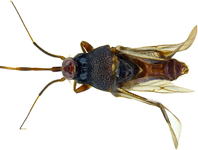Abstract
A new marine Sargassum-boring species of Limnoria (Limnoriidae) is described on the basis of specimens obtained at Kamogawa-shi, Chiba Prefecture, Japan. Limnoria aspera sp. nov. shares a reduced mandibular palp to a seta, algal-feeding, and the clavate shaped epipod of the maxilliped with the other species of non-mandibular-palp group. L. aspera sp. nov. differs morphologically from the congeneric species by secondary unguis of pereopods and unique carinae of pleonite 5 and pleotelson. We describe the sequences of the mitochondrial COI gene and the nuclear 28S rDNA gene. L. aspera sp. nov. differs by 14.2–18.0% in p-distance based on COI sequences from other Japanese species, L. furca and L. nagatai.
References
Cookson, L.J. (1991) Australasian species of Limnoriidae (Crustacea: Isopoda.). Memoirs of Museum Victoria, 52 (2), 137–262.
https://doi.org/10.24199/j.mmv.1991.52.02
Cookson, L.J. & Poore, G.C. (1994) New species of Lynseia and transfer of the genus to Limnoriidae (Crustacea: Isopoda). Memoirs of the Museum of Victoria, 54 (1), 79–189.
https://doi.org/10.24199/j.mmv.1994.54.08
Dugan, K.A., Lawrence, H.S., Hares, D.R., Fisher, C.L. & Budowle, B. (2002) An improved method for post-PCR purification for mtDNA sequence analysis. Journal of Forensic Sciences, 47 (4), 811–818.
https://doi.org/10.1520/jfs15459j
Haye, P.A., Varela, A.I. & Thiel, M. (2012) Genetic signatures of rafting dispersal in algal-dwelling brooders Limnoria spp. (Isopoda) along the SE Pacific (Chile). Marine Ecology Progress Series, 455, 111–122.
https://doi.org/10.3354/meps09673
Jones, L.G. (1971) Studies on selected small herbivorous invertebrates inhabiting Macrocystis canopies and holdfasts in southern California kelp beds. In: North, W.J. (Ed.), The Biology of Giant Kelp Beds (Macrocystis) in California. Vol. 32. Beihefte zur nova Hedwigia. Verlag Von J. Cramer, Lehre, pp. 343–367.
Kussakin, O.G. (1963) Some data on the systematics of the family Limnoriidae (Isopoda) from northern and far-eastern seas of the USSR. Crustaceana, 5 (4), 281–292.
https://doi.org/10.1163/156854063x00237
Lefébure, T., Douady, C.J., Gouy, M., Trontelj, P., Briolay, J. & Gibert, J. (2006) Phylogeography of a subterranean amphipod reveals cryptic diversity and dynamic evolution in extreme environments. Molecular Ecology, 15 (7), 1797−1806.
https://doi.org/10.1111/j.1365-294X.2006.02888.x
Leach, W.E. (1814) Crustaceology. In: Brewster, D. (Ed.), The Edinburgh Encyclopedia. Vol. 7. Balfour, Edinburgh, pp. 383–439.
Menzies, R.J. (1957) The marine borer family Limnoriidae (Crustacea, Isopoda). Part I: Northern and Central America: Systematics, distribution, and ecology. Bulletin of Marine Science, 7 (2), 101–200.
Nunomura, N. (2012) Marine isopod crustaceans of Seto Inland Sea deposited at Toyama Science Museum, 3. Suborder Cymothoida, Limnoriidea and Sphaeromatidea. Contributions from the Toyama Science Museum, 35, 77–85.
Ortiz, M. & Lalana, R. (1988) Una nueva especie del genero Phycolimnoria (Isopoda, Limnoriidae) de aguas cubanas. Revista de Investigaciones Marinas, 9 (2), 37–42. [in Spanish]
Pillai, N.K. (1957) A new species of Limnoria from Kerala. Bulletin of the Central Research Institute, University of Kerala, 5 (2), 149–157.
Poore, G.C.B. (1987) Lynseiidae (Isopoda: Flabellifera), a new monotypic family from Australia. Journal of Crustacean Biology, 7, 258–264.
https://doi.org/10.2307/1548606
Song, J.H. & Min, G.S. (2017) New record of limnoriid and asellote species (Crustacea: Malacostraca: Isopoda) from South Korea. Journal of Species Research, 6 (3), 237–240.
https://doi.org/10.12651/JSR.2016.5.3.313
Stamatakis, A. (2014) RAxML version 8: a tool for phylogenetic analysis and post analysis of large phylogenies. Bioinformatics, 30 (9), 1312–1313.
https://doi.org/10.1093/bioinformatics/btu033
Tamura, K., Peterson, D., Peterson, N., Stecher, G., Nei, M. & Kumar, S. (2011) MEGA5: molecular evolutionary genetics analysis using maximum likelihood, evolutionary distance, and maximum parsimony methods. Molecular Biology and Evolution, 28 (10), 2731–2739.
https://doi.org/10.1093/molbev/msr121
Tanabe, A.S. (2011) Kakusan4 and Aminosan: two programs for comparing nonpartitioned, proportional and separate models for combined molecular phylogenetic analyses of multilocus sequence data. Molecular Ecology Resources, 11(5), 914–921.
https://doi.org/10.1111/j.1755-0998.2011.03021.x
Wetzer, R. (2001) Hierarchical analysis of mtDNA variation and the use of mtDNA for isopod (Crustacea: Peracarida: Isopoda) systematics. Contributions to Zoology, 70 (1), 23–39.
https://doi.org/10.1163/18759866-07001002
White, A. (1850) List of the specimens of British animals in the collection of the British Museum. Part IV. Crustacea. British Museum, London, 141 pp.
Yoshino, H., Watabe, H. & Ohsawa, T.A. (2017) A new species of seagrass-boring Limnoria (Limnoriidae, Isopoda, Crustacea) from Japan. Zootaxa, 4232 (2), 251–259.
https://doi.org/10.11646/zootaxa.4232.2.8
Yoshino, H., Yamaji, F. & Ohsawa, T.A. (2018) Genetic structure and dispersal patterns in Limnoria nagatai (Limnoriidae, Isopoda) dwelling in non-buoyant kelps, Eisenia bicyclis and E. arborea, in Japan. Plos one, 13 (6), e0198451.
https://doi.org/10.1371/journal.pone.0198451
Yoshino, H. & Ohsawa, T.A. (2019) Description of new species of algal-boring Limnoria (Crustacea, Isopoda, Limnoriidae) from Japan and redescription of Limnoria segnoides Menzies, 1957 and L. nagatai Nunomura, 2012. Zootaxa, 4550 (2), 236–250.
https://doi.org/10.11646/zootaxa.4550.2.5


